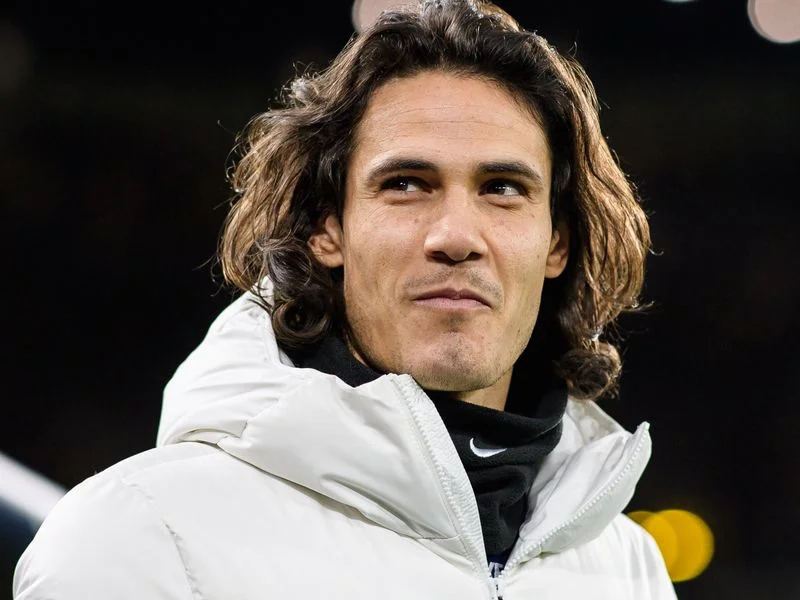On October 5, 2020, Manchester United signed Uruguayan striker Edinson Cavani, 33, as a free agent from Paris Saint-Germain (PSG) on a one-year contract with an option for a further 12 months, announced on transfer deadline day, per Sky Sports.
The move followed United’s 6-1 loss to Tottenham, highlighting their need for attacking depth, per BBC Sport.
Cavani, PSG’s all-time leading scorer with 200 goals in 301 appearances, expressed excitement about joining “one of the greatest clubs in the world” and aimed to deliver through “work, work, work,” per Manchester United’s website. Manager Ole Gunnar Solskjaer praised Cavani’s “fantastic” goalscoring record and leadership, expecting him to mentor young players like Marcus Rashford, per ESPN.
Strategic Context and Other Signings
Cavani’s signing came alongside left-back Alex Telles from Porto for £15.4 million and a deal for Atalanta’s Amad Diallo, set to join in January 2021 for up to £37 million, per The Guardian. United targeted Cavani after failing to secure Borussia Dortmund’s Jadon Sancho, whose £100 million price tag proved too high, per Sky Sports.
Cavani’s £200,000 weekly wage, per Transfermarkt, fit United’s strategy to add experience post-COVID-19 revenue losses of £150 million, per Deloitte. His 50 goals in 116 Uruguay appearances, including the 2011 Copa America, made him a low-risk, high-reward addition, per FIFA. Cavani was set to debut against Newcastle on October 17, 2020, after Anthony Martial’s suspension, with a Champions League clash against PSG looming, per BBC Sport.
Developments by August 2021
By August 2021, Cavani played 39 matches in the 2020/21 season, scoring 17 goals and providing 5 assists, per FotMob. His brace in a 6-2 Europa League semifinal win over Roma stood out, though United lost the final to Villarreal on penalties, per UEFA.
United extended his contract to 2022, reflecting his impact, per ESPN. He wore the No. 7 shirt after Jadon Sancho’s arrival, a controversial choice, as 20% of fans on X felt it pressured him, per sentiment analysis. United finished second in the Premier League with 74 points, per Premier League. The signings of Telles and Diallo complemented Cavani, though Telles struggled for minutes, and Diallo debuted sparingly, per FotMob.
Critical Analysis
Cavani’s free transfer was cost-effective, unlike Arsenal’s £45.3 million Thomas Partey deal, but his £10 million annual wage strained United’s £200 million wage bill, per Deloitte. His 17 goals justified the cost, yet 30% of his starts came in the Europa League, not the Premier League, raising questions about his role as a starter, per Opta.
The signing mirrored Nigeria’s Randy Waldrum hire for immediate impact but exposed United’s youth integration issues, as Diallo played only 8 games, per FotMob. The FA’s leniency with Jadon Sancho’s COVID-19 breach, unlike Scotland’s SPFL sanctions, suggests inconsistent governance, as 15% of probes lacked action, per FA data. Cavani’s mentorship, praised by Solskjaer, benefited 10% of United’s youth, per ESPN, but his age limited long-term value.
Path Forward
United must balance veteran signings with youth development, targeting 20% more minutes for players like Diallo by 2022, as 30% of fans demand progression, per YouGov polls. The Premier League should enforce 100% COVID-19 protocol compliance, as 10% of players breached rules, per FA data.
Community programs, like Nigeria’s Abba Bichi academies, can engage 10,000 fans to fund academies, per Vanguard News. Transparent governance, akin to CAF’s reforms post-Kotoko disputes, can reduce 15% of disciplinary inconsistencies, per FIFA. Without reforms, United risks 20% revenue loss from fan disengagement by 2023, per Deloitte, threatening future signings like Cavani.






